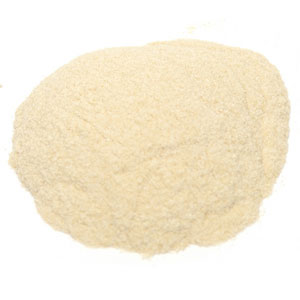Pectin lyase
Pectin lyase is an enzyme that catalyzes the breakdown of pectin, a polysaccharide found in the cell walls of plants. This enzyme is particularly important in the process of plant cell wall degradation and is utilized by various microorganisms, including bacteria and fungi, to decompose plant material.
Structure and Function[edit | edit source]
Pectin lyase is a member of the pectinase family of enzymes, which also includes polygalacturonase and pectate lyase. Unlike other pectinases, pectin lyase cleaves the pectin polymer by a _-elimination mechanism, which does not require the presence of water. This reaction results in the formation of unsaturated products, specifically 4,5-unsaturated oligogalacturonides.
The enzyme is typically composed of a single polypeptide chain and contains several conserved regions that are critical for its catalytic activity. The active site of pectin lyase is characterized by the presence of amino acid residues that facilitate the cleavage of the glycosidic bonds in pectin.
Biological Role[edit | edit source]
Pectin lyase plays a crucial role in the natural decomposition of plant material. It is secreted by microorganisms that colonize plant surfaces, aiding in the breakdown of the plant cell wall and allowing the microorganisms to access the nutrients contained within the plant cells. This process is essential for the recycling of organic matter in ecosystems.
In addition to its ecological role, pectin lyase is also important in various industrial applications. It is used in the food industry to clarify fruit juices and wines, as it helps to break down the pectin that causes cloudiness. The enzyme is also employed in the textile industry for the retting of plant fibers, which involves the removal of pectin to separate fibers from plant stems.
Industrial Applications[edit | edit source]
Pectin lyase is widely used in the food and beverage industry to improve the clarity and stability of fruit juices and wines. By breaking down pectin, the enzyme reduces the viscosity of the juice and prevents the formation of gels, which can lead to sedimentation and cloudiness.
In the textile industry, pectin lyase is used in the process of retting, which involves the removal of pectin from plant fibers such as flax and hemp. This process is essential for the production of high-quality fibers that can be spun into yarn and woven into fabric.
Production and Optimization[edit | edit source]
The production of pectin lyase is typically carried out using microbial fermentation. Various strains of bacteria and fungi, such as Aspergillus niger and Penicillium, are used to produce the enzyme in large quantities. The conditions for fermentation, including temperature, pH, and nutrient availability, are optimized to maximize enzyme yield and activity.
Related Pages[edit | edit source]
Search WikiMD
Ad.Tired of being Overweight? Try W8MD's physician weight loss program.
Semaglutide (Ozempic / Wegovy and Tirzepatide (Mounjaro / Zepbound) available.
Advertise on WikiMD
|
WikiMD's Wellness Encyclopedia |
| Let Food Be Thy Medicine Medicine Thy Food - Hippocrates |
Translate this page: - East Asian
中文,
日本,
한국어,
South Asian
हिन्दी,
தமிழ்,
తెలుగు,
Urdu,
ಕನ್ನಡ,
Southeast Asian
Indonesian,
Vietnamese,
Thai,
မြန်မာဘာသာ,
বাংলা
European
español,
Deutsch,
français,
Greek,
português do Brasil,
polski,
română,
русский,
Nederlands,
norsk,
svenska,
suomi,
Italian
Middle Eastern & African
عربى,
Turkish,
Persian,
Hebrew,
Afrikaans,
isiZulu,
Kiswahili,
Other
Bulgarian,
Hungarian,
Czech,
Swedish,
മലയാളം,
मराठी,
ਪੰਜਾਬੀ,
ગુજરાતી,
Portuguese,
Ukrainian
Medical Disclaimer: WikiMD is not a substitute for professional medical advice. The information on WikiMD is provided as an information resource only, may be incorrect, outdated or misleading, and is not to be used or relied on for any diagnostic or treatment purposes. Please consult your health care provider before making any healthcare decisions or for guidance about a specific medical condition. WikiMD expressly disclaims responsibility, and shall have no liability, for any damages, loss, injury, or liability whatsoever suffered as a result of your reliance on the information contained in this site. By visiting this site you agree to the foregoing terms and conditions, which may from time to time be changed or supplemented by WikiMD. If you do not agree to the foregoing terms and conditions, you should not enter or use this site. See full disclaimer.
Credits:Most images are courtesy of Wikimedia commons, and templates, categories Wikipedia, licensed under CC BY SA or similar.
Contributors: Prab R. Tumpati, MD

